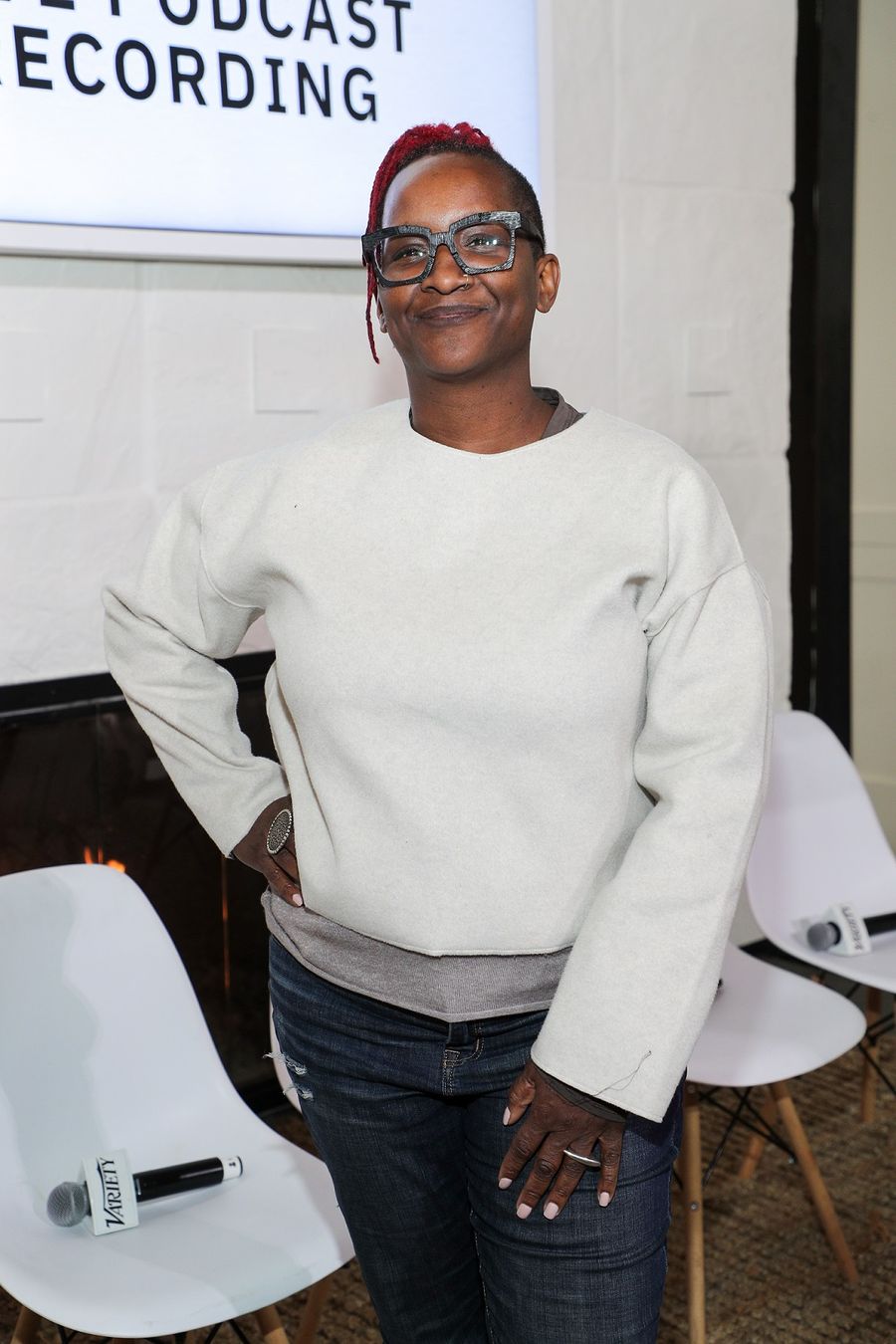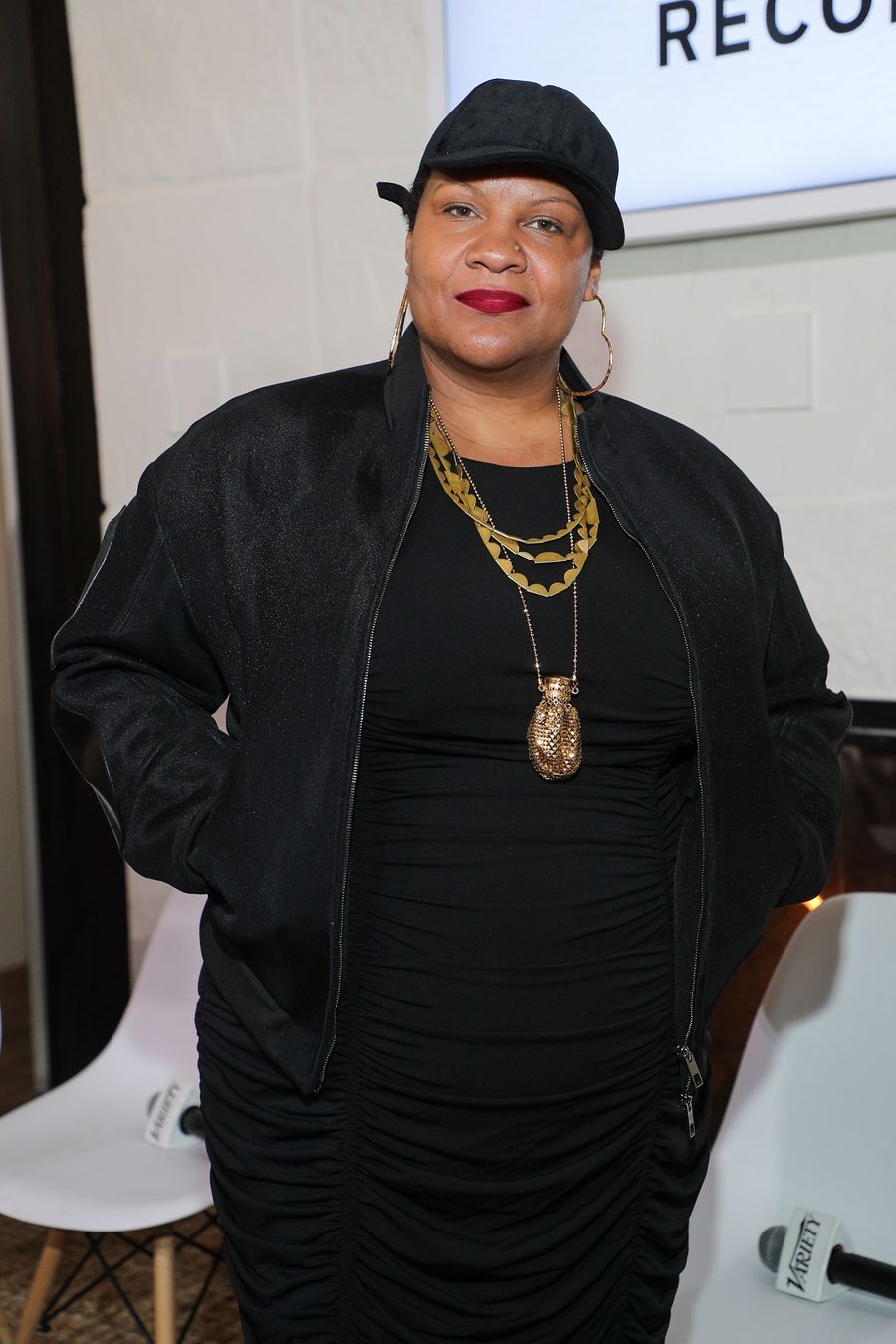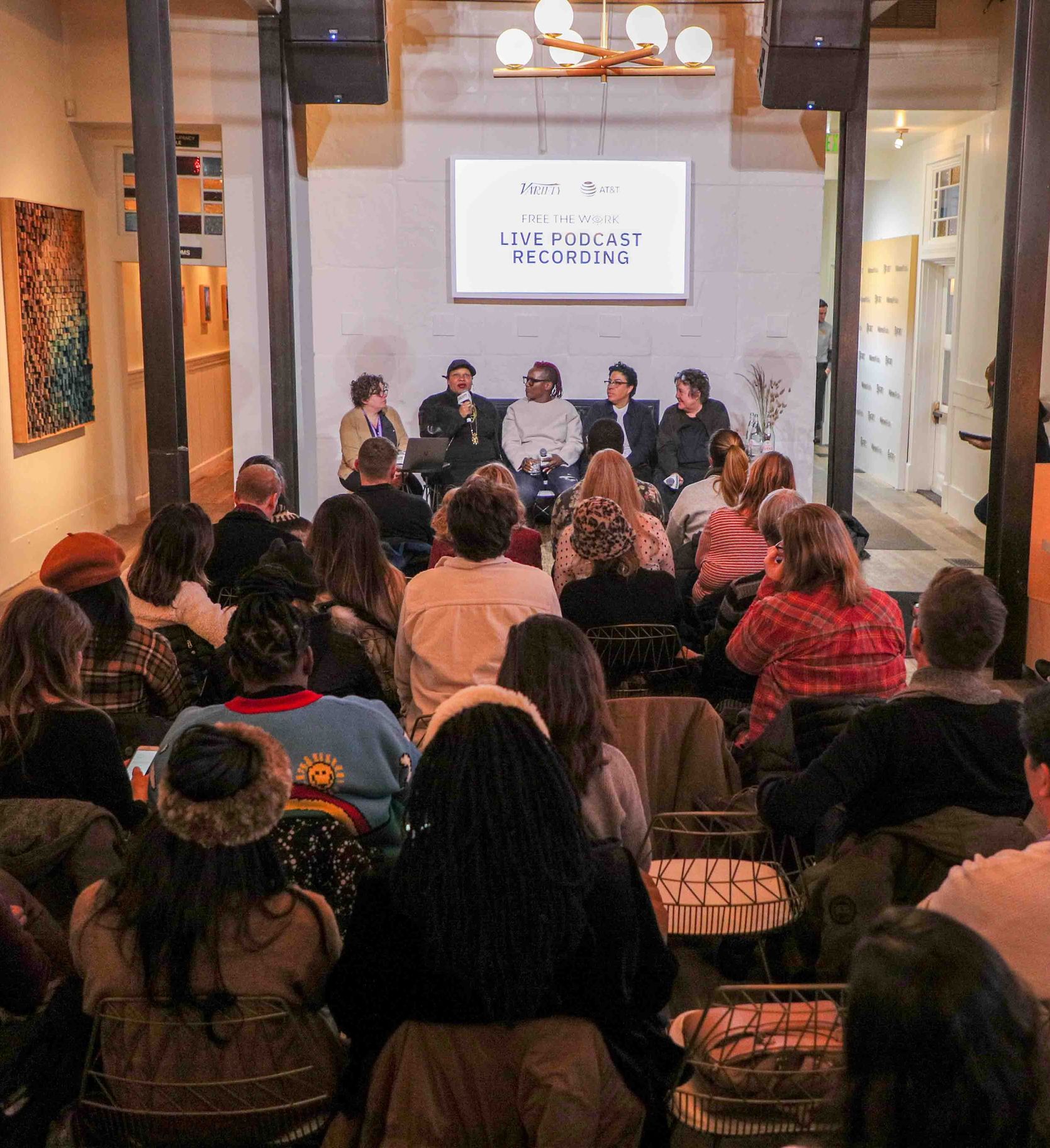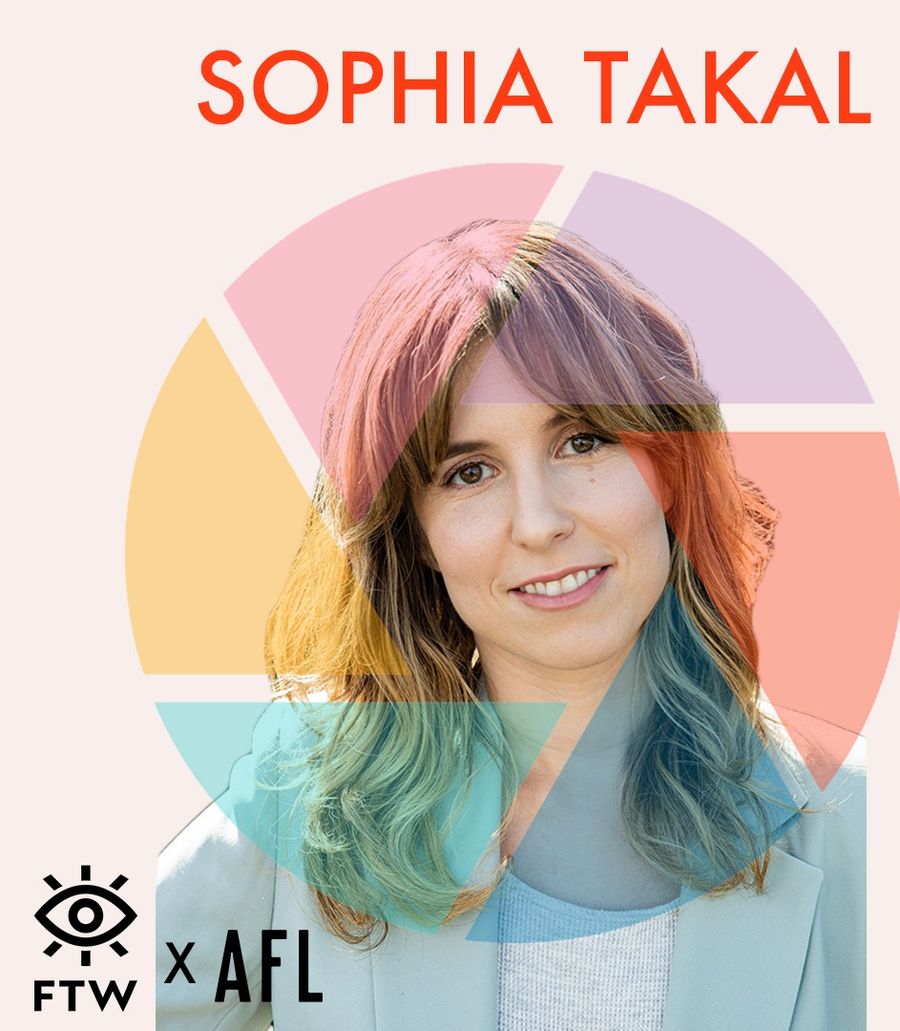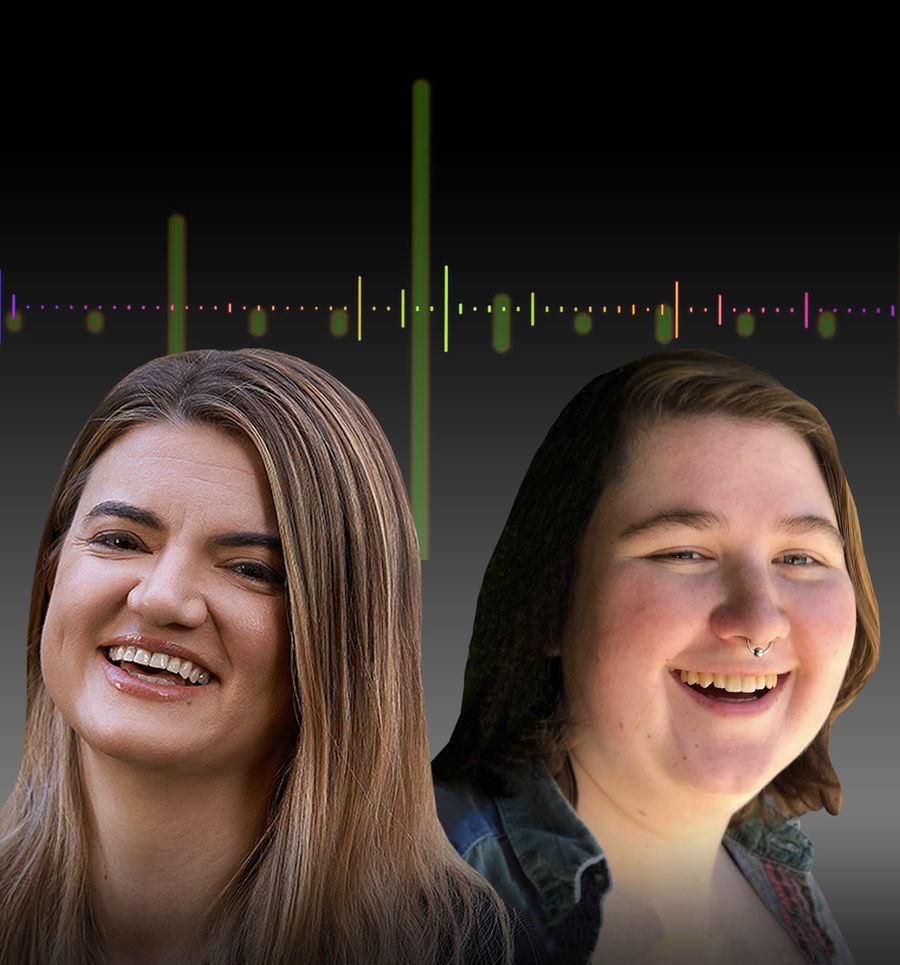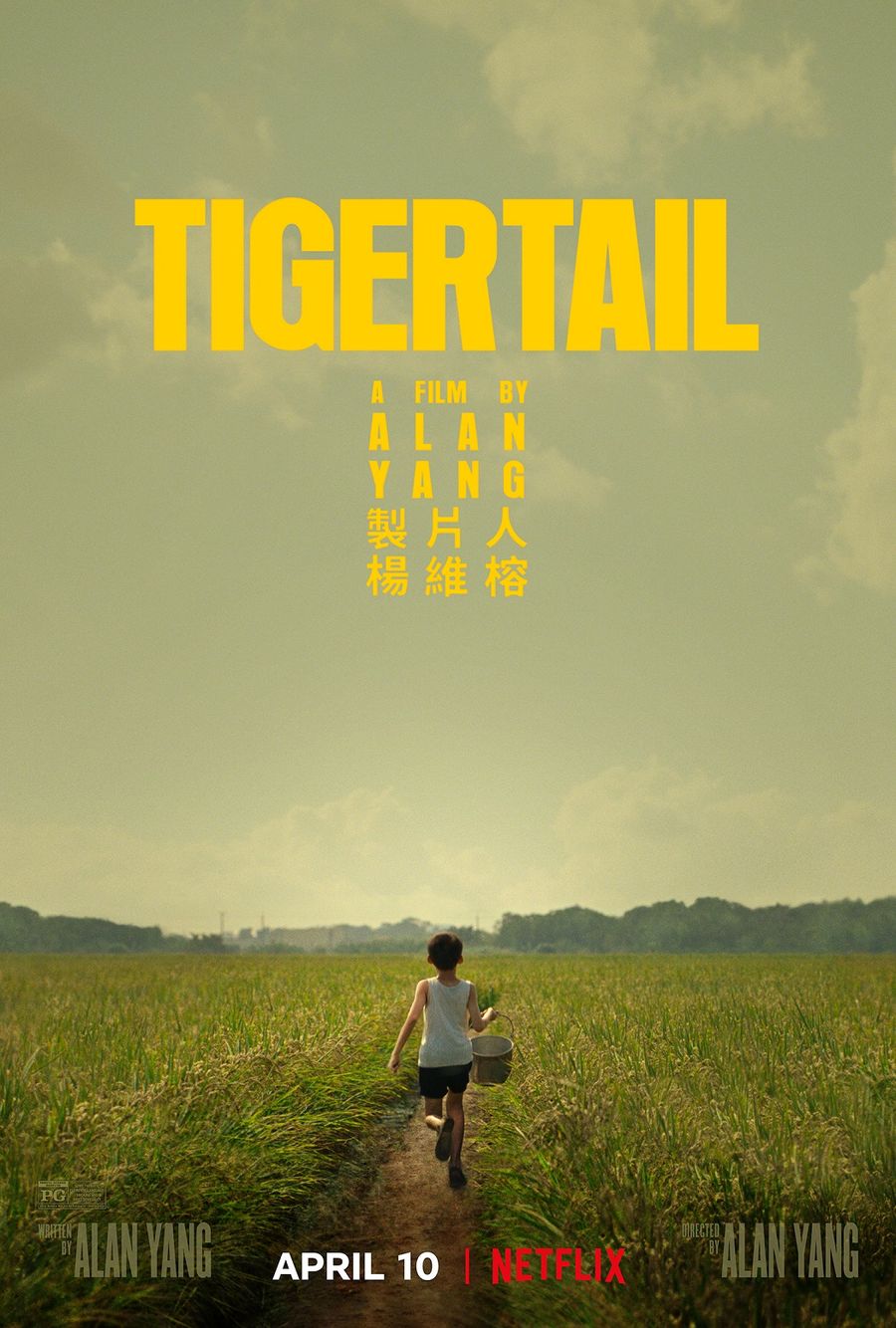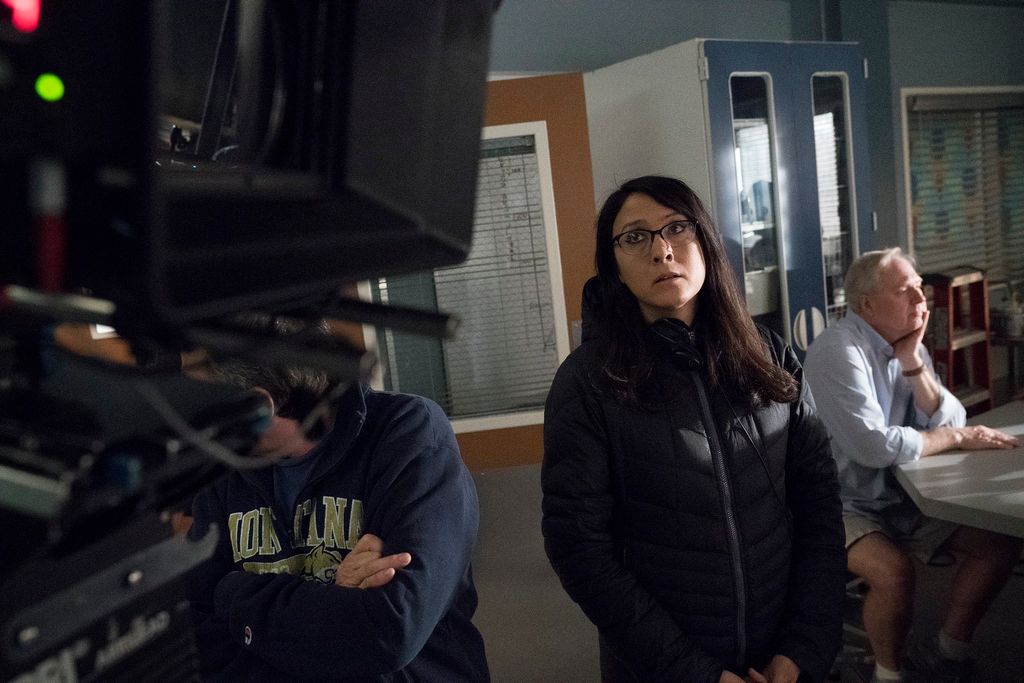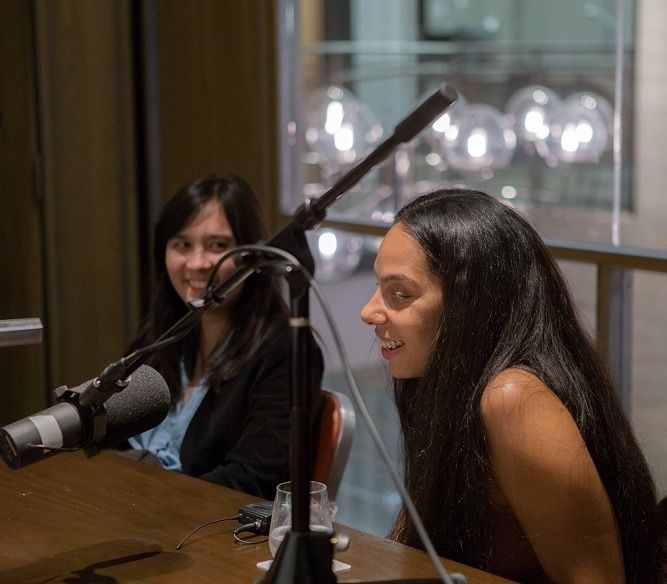Check out our live podcast recording by FREE THE WORK, recorded on Monday Jan 27th in partnership with Variety and AT&T.
In this episode, we celebrate the 50/50 initiative that many festivals have committed to, while investigating systemic barriers to entry that need to be changed. Filmmakers Radha Blank, Effie Brown, Angela Robinson, and Christine Vachon discuss with Variety's Kate Arthur about how filmmakers can strategically get their films made in today’s rapidly-changing world of streaming.
You can listen to this episode by clicking the play button above, or you can tune in through Spotify and Soundcloud. Enjoy!
(Scroll down for the full transcript!)

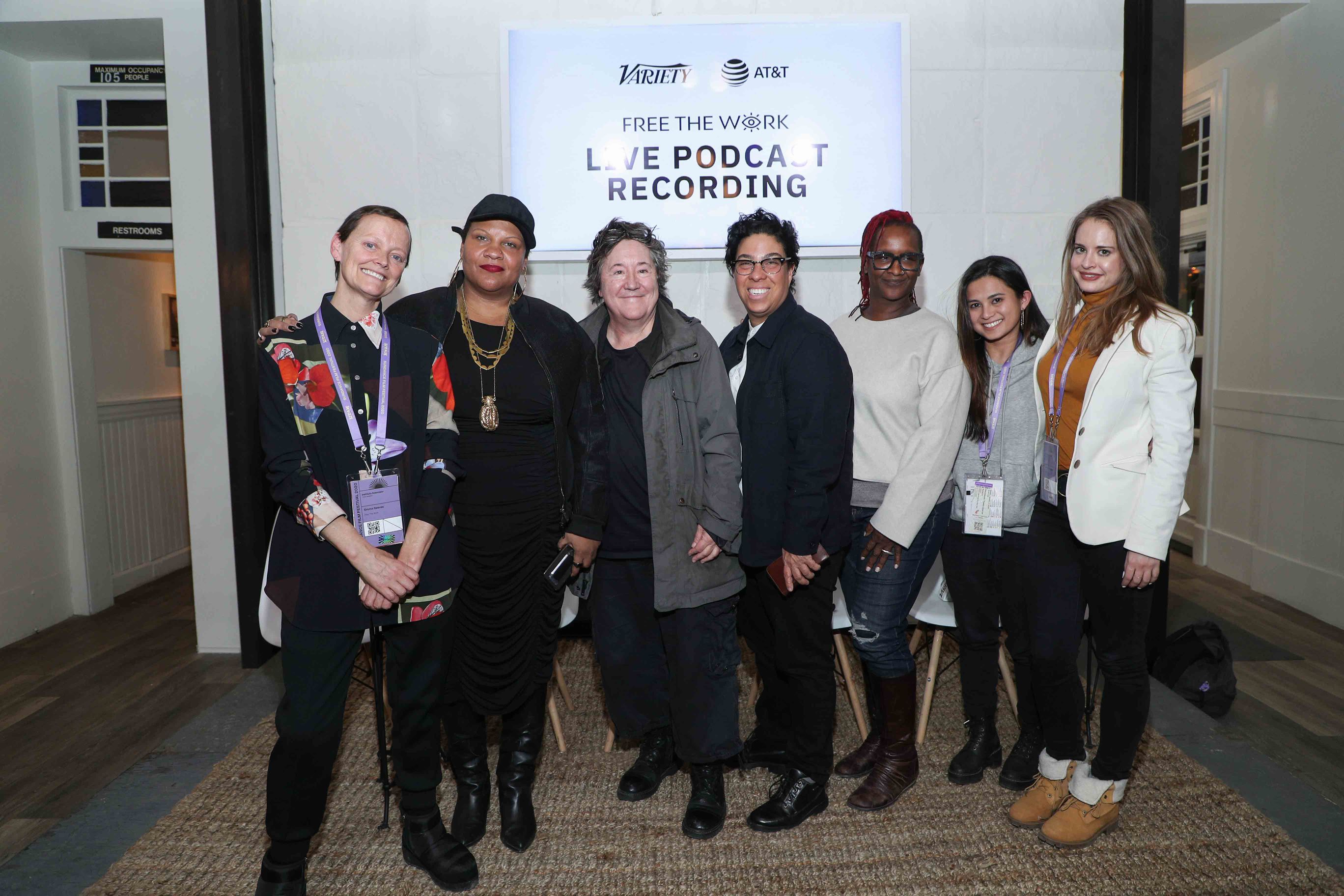
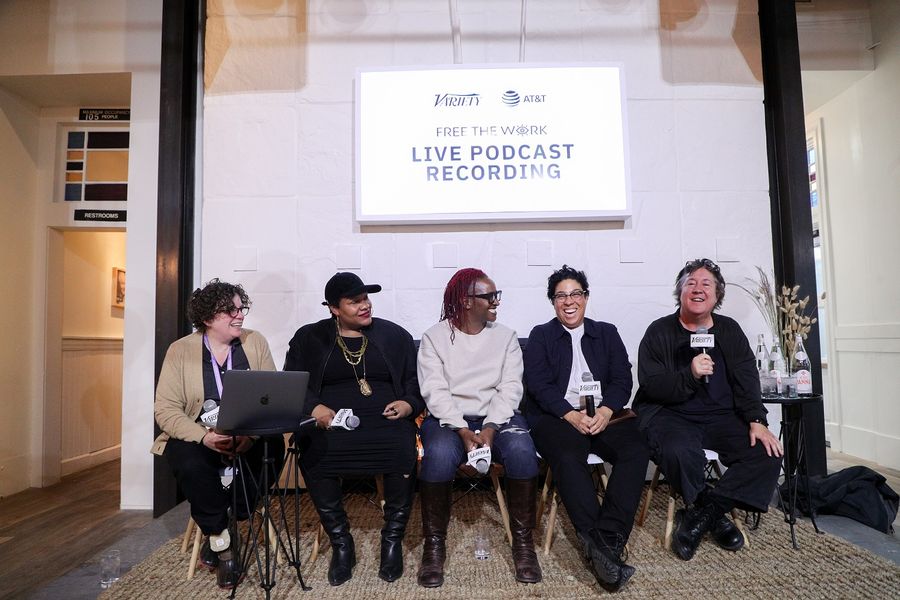
INTRO: What's up world? Welcome to the FREE THE WORK podcast. FREE THE WORK is a talent discovery platform, that uplifts underrepresented creators and connects them to those who hire in film, TV, and advertising. And now, like all respectable organizations in this age of human history, we have a podcast. Come kick back as we chat with some of today's most influential creatives. Consider this the film school that you never have to pay student loans for and the creative guidance that your horoscope could never give you. Today's episode is fresh from Sundance 2020 where we recorded live in partnership with Variety and AT&T. Moderated by Variety editor Kate Arthur, this conversation delves into the experiences of four legendary directors, writers, and producers: Radha Blank, Effie Brown, Angela Robinson, and Christine Vachon. Together they demystify the film production to distribution pipeline and discuss how their work has shifted in the age of streaming. We hope you enjoy and thanks for listening.
Kate Arthur: I'm Kate Arthur. I'm Variety's editor at large and we're here at the WarnerMedia lodge for a FREE THE WORK podcast recording. If you don't know FREE THE WORK is a nonprofit initiative dedicated to identifying systemic inequalities in film, television, advertising, and media, and finding actionable solutions to expand access for underrepresented creators. It was founded by Alma Har'el, who on Saturday night, won the DGA award for first time feature film for Honey Boy. Alma couldn't be here, but anyway, she's great. And now to our esteemed panel of filmmakers; Radha Blank is a performer, writer, and director. She has written for Empire and She's Gotta Have It. For her debut feature, the delightful 40-Year-Old Version. Radha wrote, directed, stars, and raps in the movie, which is in the U.S. Dramatic Competition here. Don't hold your applause.
Effie Brown is an award winning film, television and digital producer, and a champion of inclusion and diversity in Hollywood, both behind and in front of the camera. She has produced such things as Real Women Have Curves for HBO, Justin Simien's Sundance award winning debut feature, Dear White People, and the Disney Channel musical Zombies.
Effie Brown: That one's very important.
KA: I liked how it read in your bio so I added it. She also appeared in front of the camera—
EB: —And kicked ass—
KA: —on HBO's revival of Project Greenlight, and I will add as a personal comment, became the avatar for the audience who could not believe the nonsense we were sometimes seeing. Most recently, Effie was tapped as CEO of Gamechanger Films, the first film financing fund by and for women and underrepresented filmmakers. [crosstalk 00:03:16].
KA: Angela Robinson, an old friend of mine, is a writer and director whose most recent film was Professor Marston and the Wonder Women. She has written on such shows as True Blood, Hung, and the original L Word. She has a deal with Paramount Television and is a founding member of Time's Up and co-captain of the Time's Up Woce group, give it up for Angela.
Angela Robinson: W-O-C-E, not K-E-
KA: Yeah, but, you say woke, right? That's what I've heard.
KA: Christine Vachon is the founder of Killer Films, a legendary force in the independent film world. [crosstalk 00:03:54] She has produced such films as the Sundance Grand Jury Prize winner Poison, and everything Todd Haynes has directed since. [crosstalk 00:04:03] She produced Boys Don't Cry, Still Alice, and so many more. Christine is here at Sundance this year as the producer of two films, both of which are excellent; Zola and Shirley. Thank you all for being here and welcome. Radha, I wanted to start with you.
Radha Blank: Okay.
KA: As a first time filmmaker, what's it been like for you to experience Sundance audiences, which include critics and potential buyers seeing your movie?
RB: Did you have to ask me that? No. It's been amazing. This is probably the fifth time I've been at Sundance. First time as a filmmaker. I'm tired as fuck, but it's that good tired. And I'm really happy that I went to the Salt Lake screening of my film because the dream is to come here, connect the film with an audience and sell the shit, right? But I don't want to miss out on the connect the film with the audience part. And it was refreshing to have an audience that didn't include any industry, or family, or friends, because you know family and friends are going to laugh extra hard and loud for you. And it was exhilarating. I mean I'm really learning a lot about the film and so I feel… What a blessing to finish the film and then a few weeks later, really was just a few weeks ago, share it with an audience. It tells me what I have in the film and what works and maybe what doesn't work. So it's been great.
KA: For the other panelists: What does happen after you sell a film at Sundance or at another festival?
EB: Christine.
RB: Christine.
CV: I'm like, "Can I can get the O.G.?" I mean when you mentioned Poison, that was literally 25 years ago and I'm sure everybody here is like, "Oh yeah. Poison. Whatever that movie was." Anyway, I guess what happens… Selling a movie here, when I first started coming to Sundance, it wasn't the market that it is now. In fact, the first film I sold here was Go Fish. And again, I can see how…I remember our producer's rep who was John Pearson, the writer of Mike's, Spikes, Slackers and… I'm getting it in the wrong order. Anyway, you know what I mean. I remember he said, "We're going to sell this movie at the festival." And I was like, "Wow! Okay." And we did. But then that started to become part of what the festival was about. And I sort of miss the old days when it wasn't, but the hustler part of me is like, "Of course, this is the greatest platform." For all the reasons I think Radha mentioned. I think it's great you went to Salt Lake for exactly that reason because then you finally see what it's like to see it with people who aren't invested in you. And I've done the same. Selling a movie here is exhilarating, frustrating. My movie hasn't sold yet. I think it will, but… And when it does you breathe a sigh of relief and you go on to the next chapter.
KA: Does anyone else want to answer that? What happens after you saw a movie at the festival or… Effie?
AR: I have never actually sold a movie at a festival.
KA: Really? You will.
AR: I've always had-
CV: [crosstalk 00:05:50] Distribution ahead of time. I was like…
EB: For better or for worse, sometimes, for better or for worse sometimes.
AR: I've come to Sundance with films that have already had distribution and I've also had films that sell here. I'll just speak the truth and maybe… A lot of times as producers we get sort of locked out of that process. And that's something that I think people… It's really great when you get the number and you get the sell, but then the reality sets in when you're like, "Oh shit, they're taking the movie a little bit away for you." And they have powers that are better, powers that be, that are smarter than you supposedly, that sort of take it and run with it. They promise you, you know what I mean? Like, "You're going to be a part, we're going to listen to you, and we're going to do all that." But it's that sort of fine line and that's the truth. And anybody who has sold something just sort of be aware and I think has had that experience. Sometimes. Most times. All the time. I'm not going to lie. You know what it's like.
KA: The festival to release pipeline, the in-between part, what is that process and what are the most challenging parts that most filmmakers don't foresee?
AR: Wait say that again?
KA: And Angela, since you've never had to sell a movie at a festival, what in terms of marketing and all of that stuff that happens in-between, before the movie comes out, after you've sold it, and when the movie is about to come out?
AR: I've had both experiences, often that's crazy. I was with Sony Screen Gems for D.E.B.S., which was my first feature that premiered here, and I wasn't sure. Basically they kept Sony, and my hat always off to Clint Culpepper, who believed in the film.
KA: Clint Culpepper! Yes!
AR: Clint Culpepper, right? It was amazing and such an advocate for the film, but there was all this internal stuff, to this day I'm not sure, where they would put the logo on and then take it off and then put the logo on. So they weren't quite sure whether they were going to release it or try to sell it at the festival. So when they decided to keep the logo on and not sell it at the festival, but then my film entered a no man's land. It had a bunch of heat off the festival and would have done better to come out quickly. But they just didn't quite know what to do with it and it was like eight months later. But I had nothing to do with the poster. I got the poster, they said this is it. They'd already printed it. There was a typo on it. They really had zero idea. They didn't put Jordana Brewster on the poster who was… It was about her. Anyways, so that was kind of terrible. Because you had zero… Just anything to do with it. So you shepherd your baby all along and then it was sold. And then it was like you'd left it on somebody's doorstep and then it kind of came out. And then I've been involved with films that were incredibly inclusive where you were brought in and they show you the posters, and they show you the trailers, and then get your input, and the printer was incredible with Professor Marston. And I mean a Disney movie and they just do a whole song and dance. So then I've had good processes, but it can go either way. But the best scenario is when you're very included with how it's going. Because you understand your film best and a lot of times the people doing it are just some other… you're in their inbox. Right?
CV: Right. But the great companies, in my experience, understand that you do understand who your audience is. And to go back to Go Fish, and again, I feel like I'm using examples that are a hundred years old, so I apologize. But we sold it to The Samuel Goldwyn Company and none of the people who worked there at the time, even though they really believed in the movie, looked like me, or Rose, or Guin. And I remember sitting down in a room and they were all sitting there with their pads and their pencils, so excited about the movie. And they said, their first question was, "What cities have a lot of lesbians in them?" And we were like, "God, I…" And I think maybe Rose was like, "North Hampton?" I tell that story a little bit to be funny and provocative, but it's also… At least they asked.
KA: Christine, I think this question is for you more than maybe other people. But everyone jump in. How has the streaming business changed the selling process at a festival and opportunities for filmmakers?
CV: Look, I think it is all… And I want to hear what you guys have to say about this so I'll be really brief. I think there's a lot of different kinds of opportunities, but I think that filmmakers have to really start to think about what they really want their endgame to be. And there's so many factors in there. The people who put up the money and what did they put up the money for? Is it about branding their company? With a sale, perhaps a lesser sale to a more prestigious distributor? Or is it really about getting the biggest number possible? And all of those things… I think if a filmmaker can figure out going in with the financiers what that endgame is, it makes for a lot less heartache on the other side. Because I've also been involved in movies where our desires have not aligned and that can be really tough.
RB: I feel really fortunate that my financiers are very open and very supportive of things that I… like I've made a black and white film. It's black and white on 35 millimeter film. And I just always imagined people being in a theater, eating popcorn, and the two women from the Upper West Side are like talking too loud in your ear, and they're opening their candies. I just imagined that whole, "What do you mean they're divorced?" "Oh, they're…," I just imagine that kind of chatter and energy. And so it's a conversation that my financier's and my producers are very open to. But I also have to consider getting the film to a larger audience. I guess some people might considered it a Art House film. But it also has some commercial potential. It's still something I'm weighing. I just did not imagine the film being on a screen this small. So it is something that I'm having to kind of… I always imagined, "No, it's black and white. It's only going to be in theaters." But there's an audience that maybe can't get to that theater. So something that we're talking about. So, yeah.
KA: Has it expanded the market though? I mean, just that Amazon and Netflix are players. Is that something that people think about even maybe at the conception stage of a movie now?
CV: I mean, I think now that when somebody pitches us something, because it used to just be this is either a movie or it's not because there wasn't anything else. Then we started being like, "Oh, TV's in our grasp. So yeah, it could maybe be TV." And now there's that nuance, that sliver of nuance of…it's a little bit more something that is better for a streamer, but why? Or I guess where it really goes back and it's kind of what you were just saying, Radha, what makes something theatrical? That's really the question. And that is a discussion that at Killer we have constantly. I haven't seen Radha's movie, but-
KA: It's amazing.
CV: But I read the script-
KA: It's great.
CV: And I know it's amazing. I know it's amazing.
RB: Christine Vachon read my script. I mean come on, guys.
CV: But when I read it, I knew that it was, because it was a very original voice and I could just tell this is something… It has that like zhuzh but sometimes it's just hard to…I mean I want to know what you guys think about that because…
EB: In my opinion, I am loving that there are streamers. I'm loving that the Amazon's, the Hulu's, the Netflix's, God bless Netflix. You know, all of those that are there, because as a indie producer, not nearly, you know what I mean? The prestige of a Christine Vachon. No, fuck. I mean you're an icon.
RB: Come on.
EB: You were the person who knocked on a shitload of doors for all of us. So let's just recognize that. And now… Yeah, really, recognize that. You know what I mean? No, I'm not trying to be…That's the truth. That's the truth. But now we have so many different outlets now and it gives us more opportunity for different voices; women, people of color, LGBTQ, and people with disabilities, to get their stuff out there. And I feel, and granted I'm not a director, do you know what I mean? I'm not a director. And my thing is as a producer, I want to execute the vision, but I got to make my financiers money back or else I'm not really making another movie. Do you know what I mean? So I like to partner with my directors ahead of time to be like, "Do you want to just see something with popcorn or do you want the most people to see your movie?" Do you know what I mean? I feel you. And that's a real thing of being…That's really important. And also a lot of times streamers are able, for the movies that we've done, they're able to buy you out, give you a premium, and be done. Do you know what I mean? Where a lot of times with theatrical, I don't know about you, my movies have all made money, but I've yet to see money. It's a deal. Sorry.
RB: But, no.
EB: Tell me everything.
RB: No, but how many people here go to Netflix, they'd go to their Netflix, whatever. And it takes you an hour to find something to watch because there's almost too many things to watch.
EB: But you can find something to watch.
RB: That's true. That's true!
EB: Do you know what I mean? And I'm not mad, it's just a good discussion. Like you can find something to watch. And there's many different things. At a movie theater, I mean, with love in my heart, if you don't go to an Art House movie theater; you're seeing the Marvel movie, you're seeing the Ford and Ferrari, you're seeing shit that they're thinking that the four quadrants are going to see. That might be getting a little too business-y, you know what I mean? But that's what it is.
CV: But I would like to ask you a question, which is, do you feel like all of these different outlets change the kinds of stories that you want to tell? Or do you feel like, "I'm going to tell this story for Netflix and this story for theatrical?" How does that affect your process?
RB: It's interesting because my bread and butter is television. So I've been involved in a lot of the streamer conversations. But from the television angle, and recently from a film angle, at my core I am just an indie filmmaker. It kind of doesn't matter what I do. And my thing is you just want to do one and to do well enough that you can make another one. I've always been very, kind of just myopic, I don't care. It's just about trying to live this life and be able to make these things. And the landscape has changed, I don't know what it's going to be in three months. It's changed so radically that I feel like every time I try to even anticipate anything, then in two weeks, it's just… that whole model is gone. Those assumptions that I had. And it takes a minute to make a movie, right? I mean it takes from when you're writing it, through it… And I used to always try to game out all these strategies. But then I've stopped kind of trying because I don't even know… Netflix may gobble everything up or it may be gone in like six months. No, I mean just it's-
CV: I have a deal with them. Wait a minute, now. [crosstalk 00:19:44]
AR: It hasn't made any money. Netflix, has not made any-
RB: [crosstalk 00:19:47] lot of debt.
AR: They have a lot of… Billions and billions. It hasn't made a dime. So, sorry, maybe I shouldn't get on this-
KA: We're all talking tea.
AR: But I have had conversations like I have a film that I'm getting ready to go out with and the conversation has been like, "Oh, that is a Netflix movie." And I still have a generation that just thinks theatrical, knee jerk, but I'm just going to go with whatever I think will get… But if you were to ask me, just as, in my filmmaker heart, I fear being a tile among many tiles that an algorithm is boosting to somebody.
RB: That's what I meant about that homepage. There's-
AR: I just-
RB: So much content and my fear is that we get lost in the shuffle. I'm just being honest.
AR: I agree and-
CV: You will never get lost in the shuffle, Radha Blank. I'd mean come on now.
AR: I was going to say, bringing us back to old paradigms. I remember there used to be the Mini Majors and they'd make a queer film. They'd have eight movies they'd make and one or two would be a queer film. And then LOGO and here were like, "We're going to have a channel." And we were like, "Yay, we're going to have a queer channel to ourself." That's going to be amazing. And then they have the channels, but then the Mini Majors were like, "Oh, you have a place to go. So we don't need to make those movies anymore." Except the place we had to go had no money to make the things. And so then there were no things. And sometimes I fear that Netflix is like Soylent Green as people, do you know what I mean? It comes in being like, "This is awesome." But then at the end of the day, I don't know, it scares me.
RB: Does LOGO even show gay content [crosstalk 00:21:31]
KA: Effie, I think everyone's very curious about your company: Gamechanger. Can you tell us about it?
EB: Why, yes I can, everybody. Fancy that? No. So, Gamechanger was originally established in 2013 it was a film fund that was primarily for female filmmakers to gain parity within the Hollywood system. They did really great. Now we're expanding and that's when I have come in. And what we're expanding is to not only just women, but we're also expanding to people of color, LGBTQ, and people with disabilities, to amplify their voices and to get their movies made. Now, a lot of folks are potentially doing that. But what we are doing in addition to that is that our investor pool is as diverse as our content. What we're also trying to do, what we feel is; is that we have to have the people, the films that are reflecting the people that were making it, were also being able to invest in them as well. That was a really complicated sentence. I'll say it again. But that's what we're doing. And we're really excited about it. We have an investment group and we also have a development fund. We're going into television and episodic as well. But we're really looking for a place and a home to amplify these voices where these people will be pitching to and being in business with people that look and reflect their community. Which is very important.
RB: Very important. I came out of Catalyst and did a whole presentation, took out my tap shoes, made people laugh, I rapped and everything and people were saying it was the best presentation. I walked away with nothing. I'm not trying to criticize my Sundance family. We've already had that conversation about the lack of diversity in terms of financiers. I do not think this movie would have been made-
EB: Tell it, preach it.
RB: If it wasn't a gay black woman, a gay black man, and a queer Indian man behind it. Just keeping it real. That people in the quote-unquote margins were the people who, when they looked at the script, and they saw that I was lead, and we were shooting in black and white, it was a no-brainer. Whereas for the last six years, a lot of people scratching their head, they loved the script, I think that they probably wished Tiffany Haddish would play the 40-Year-Old Version. But these particular producers, I'm talking about Lena Waithe, Jordan Fudge at [New Slate 00:00:24:14] Ventures and Rishi Rajani who runs her company, Hillman Grad. I just want to know how do we replicate that model? Yes, we've got Gamechangers but we need more of Hillman Grads to pop up who are not going to ask you to change who you are just so that they can get you a little bit better. You know what I mean?
EB: I agree but let me just say, and there's room for more than one. Because Hillman Grad did it, Macro is doing it, and I think Array is doing it. There's room for all of us, but I have to say that I'm really happy to be a part of Gamechanger because that's our emphasis. As well as to make sure… Because it is. If we don't bet on us, who the hell is, you know what I mean? And I said yesterday, we are dealing with the systemic racism, ableism, homophobia, misogyny. That's what this business is. It's a reflection of the world that we live in today. That is true. But if we don't bet on us who is. And I believe that we're going to dismantle this fucked up system, but once it's dismantled, what are we getting ready to put in its place? Do you know what I mean? That's important. And I think that that's on all of us.
Interview Group: Yes. Yes it is!
AR: And one more thing to add onto that is ownership.
EB: A hundred percent.
AR: Ownership. Because even if you, I love Black Panther, I love all… I get first in line for all of the Marvel movies. I do the whole thing.
EB: Who's making that money?
AR: But who's making that money? You're like, "Yay!" Except when you come back, you're like, "Wait, who's actually cashing those checks?" And I don't know if it's who we think it is.
EB: I know it's not who we think it is. So I can say that for sure. But it is. It's having the agency and ownership because that's the only way that you build legacy and that you're able to actually amplify the other voices. Anyway. What you think, Christine? You got it.
CV: I agree.
EB: Because you've been doing this for years. She's all like, "Look, you all young bucks coming in." She's just all, "I've been here."
CV: I just want to say making a middle aged woman sit in front of this fire… My back is hot, you all.
EB: [crosstalk 00:26:18] It's hot! It's burning up.
RB: The whole time we're talking I'm like, "This fire… I'm on fire." Literally. [crosstalk 00:26:29] I didn't know I was starting the flashes at Sundance, but here they are.
AR: Lord.
EB: Get some powder!
KA: Speaking of fire, in the fall of 2017 the post Harvey Weinstein reckoning quickly led to the broader conversation about inclusion in Hollywood. What's that been like both to witness and to participate in those changes?
CV: I think the optics are getting better. And I'm not saying that's not something, but I do think that we absolutely cannot get even a teeny bit complacent. Because the fact is when I go into those rooms, you go into one room, you go into the next room, you go into the next room, you go into that last room. To get your television show greenlit, your movie, what have you. And those people, the ultimate decision makers are still exactly who they've been for the past 50 years. And it's til the people who control those narratives change, until those people start to look more like us, it's not going to change that much. And I don't mean to put down everything that we've achieved because I'm proud of it. And everybody here has been a giant part of that and it is great. But it's very frustrating to feel… Sometimes people are like, "Oh, the Academy let in a few more…" Look, the Academy's trying but it's just we have to do… Well, I mean look. Effie, you said it, we've got to dismantle it all. And start all over again.
KA: I would love for everyone to answer this particular question. So, Angela? Woce group.
AR: I am! I call it punching the blob. You know you go boom, boom, boom, boom, boom and you see a dent and then you turn around and it goes… It really has a muscle memory to not include you.
KA: Oh, that's a great line, "a muscle memory."
AR: Personally my experience, I was kind of, in the initial conversations around Time's Up, right after Harvey. And for me it was, I call it disaster feminism because in a way I was…Naomi kind of has disaster capitalism. So if Katrina happens and everybody's worried about the hurricane, and everybody's dealing with the disaster, and then all these people come in and get these shady bids, for electrical or infrastructure and stuff like that because everybody's dealing with the disaster."
So I was in the room and it was a disaster, but I was like, "Let's do some disaster feminism." So while everybody's freaking out about the crisis, which does demand a lot of attention and change, maybe we can just use it to try to lay some infrastructure. And just sneak into places that wouldn't necessarily have let you in except that there was a disaster happening. And then maybe you can kind of get farther. Kind of nudge yourself in there and see if you can leverage your way. So for me it's always one step forward, two steps back. But I do feel it's about leverage and a tipping point. And the jury is kind of still out for me over whether any of this will stay. And also we're doing it on top of all of these changes in the industry. I remember being in a meeting at an agency and we were talking about inclusion on crews or things, and then one of the big honchos was like, "What do you mean?" The White Walkers are coming, right? They were like, "Why are you worrying about this pipeline when the tech is coming in and just going to eviscerate our industry if we don't just try and…" I'm in a video game, right? First person, just trying to level up.
KA: Effie?
EB: So, I'm really grateful that I was brought up as an Army brat and that I've always been a fighter. So I feel, randomly, that I'm sort of primed for this. I've been black and a woman all my life, you know what I mean? This was never, I don't know what industry was ever like, "Come on in." We've always had to fight. [crosstalk 00:30:48] It'll be recorded. So I've always been… and I'm grateful that my father always made like, "What's the end game? This is the end game. What are the steps to get there?" So I knew that and I've just been practicing it ever since. However, every movie that I've made from But I'm a Cheerleader, right? You know what I mean? But Andrea Sperling was a producer, I was a Line Producer, Jamie Babbit, has always been about the other, our diversity and inclusion. EB: When you're black and a woman it's like, "You're not doing anything new. You're just employing yourself and employing other people. You know, it's got a job." But what was interesting is it wasn't until, and I keep…I'm sorry, I don't want to drag Project Greenlight, but it wasn't until Project Greenlight where I joined that because I was poor, you know what I mean? I did a film called Dear White People and I talk about money because secrets are the thing that keep people down. I made $40,000 over two years for that movie, almost lost my house and almost got my car repossessed. So when HBO said, "Hey, can you come and produce this movie, and there might be somebody just documenting the director or whatever." I was broke and I was like, "Yeah." So I made that decision out of fear and poverty. Just to be real about it. And it was so interesting, is that I had to stay in that. And I'm grateful at the end that people got to see what it looks like every day. Project Greenlight wasn't anything new or… You know what I mean? Nobody treated me… People of color, women, everybody else was like, "Oh yeah, that's what it looks like." You know what I mean? And I'm grateful that at the end that black Twitter came to my defense and sort of held me up. But I'll also be very clear that the things that I said, I've been saying from episode one to whatever. And it wasn't until Lynn Amato, who I love, who's the head of HBO films, repeated everything that I said, that that's when I became vindicated. Isn't that fucked up? Do you know what I mean? But that's just the way that it is. But I'm grateful that after this conversation, that now people maybe know. Became less of a secret and that the fight became a little clearer. I love what you said, Angela, about the muscle memory of not including us. Which is why I'm like, "You know what? What if we stopped silo-ing ourselves, black people here, Native American, Latinx here, LGBTQ, people with disabilities. What if we all just fucking women came together and put our little monies together, which will be big money." You know what I mean? That's how we're going to be able to change the system. And I know it sounds lofty, I know all of that, but I have another five or six years of good energy before I take a nap. You know what I mean? So that's what I'm looking for.
KA: Rahda, do you want to jump in?
RB: This is so funny because when I hear Time's Up and Me Too, these catch phrases… Tarana Burke, she has a name. Myself, Alisa, some other people here, are actually friends with her. She's from the… actually from the Bronx. She's someone who is really out there doing the work. She's not just talking shit. And really, really challenging people to stand up and do the work. But I just had to say her name because I tease her sometimes, I call her the Me Too lady. But she has a name, her name is Tarana Burke. And I think people see her, but I don't know if they see the work that she actually does on behalf of specifically black girls and sexual violence that has… But just in terms of my personal experience of working on this film, this was the first time the idea of an intimacy coach came up and that fucking blew my mind. I was like, "Oh shit." I mean, I know it's kind of connected to some other dramatic shit with a Showtime show, I think. But I really do feel like it comes out of the work that this woman and other women, other activists like her actually did. In challenging the system, the many systems. I ain't letting Hollywood off the hook, don't get that wrong. But I was a little like, "Okay, that's something." That there are people actually employed to make being on set a safe experience for both genders. The idea of hiring an intimacy coach wasn't for me, it was for the young actor who was playing my lover in the film. He had never acted before and I just thought it was weird that I would be like, "Okay, so you're going to get on top of me right? And then you're going to act like you don't want…" I was like, "I feel like there should be someone kind of creating a balance between the two of us." Now did we hire this person? No. So I ended up being like, "So you're going to get on top of me, right?" No. [crosstalk 00:35:49] My point is that that was available to me and that my producers were invested in creating that kind of work environment where man, woman, it doesn't matter how people identified. That if they were in a scene where there was some kind of touch involved, there was someone there to help facilitate that. And I was like, "Okay, Me Too lady, and all of the soldiers in that movement." This is some kind of progress where our industry is concerned. And then my final response to that, is I always say I don't have the wherewithal or the intellect to be a real activist. I get tired, I'm going to put the protest sign down for a second and rest of my arms. You know what I mean? But I hired department heads, who hired people, who look like the people in the film. And people would come on set and be like, "Oh my God, there's so many queer women." First of all, my locations manager, I feel terrible because I'm forgetting her name right now. This sister, she fucking killed it. I'm sorry. I'm just saying I am so proud of, not me hiring the department heads, but that the department heads went out and hired who they hired. So people were like, "Look at your set. Look what you did." No, no, no, no, no, no. It was the people that are hired and being inclusive was important to them. I don't know what the numbers are but it was predominantly women, a lot of queer folks, a lot of people of color, and the men that were present were feminists and I'm really proud of that. I know I'm all over the place but-
CV: No, you're good.
RB: That's how I try to do my part because I'm not really that smart, actually. When it comes to activism I'm a little lazy, so. Now that the fire is off I'm…
CV: I was going to say.
RB: Now that I actually have to think about something else than the fire being at my back. I'm a little at a loss, I guess.
KA: We're all feeling a little sassier now that the fire's out. We're going to take a few questions from the audience for anyone who has them. I'm going to repeat the question just because this is being taped for a podcast. This woman is a line producer and wants to make the transition to being a producer and would like Effie's and anyone else's input on how to make that transition.
EB: This is what's so interesting. I wasn't the line producer on Project Greenlight. That's how they portrayed me. The line producer was a woman named Nicole Colombie. Nicole Colombie has done quite a few films with me, but this is also about who gets to tell whose story and the power of the image. It was my company. It was a Duly Noted, Inc. production. I was creatively involved with picking the script and figuring all that out, creatively from beginning to end. But it's so good that you asked this question, just because it's indicative of the problem that we go through when we're moving from line producing to producer and it has taken me a very long time to get to this point. And it's a bit of a stigma, I would imagine if when someone's being like, "Oh, you're an actor and a director," do you know what I mean? "Are you an actor first or a director?" Do you know what I mean? Like, "Are you a nuts and bolts girl? Or are you the creative person?" And we all know that money oftentimes has a strong hand in what you can do creatively. Do you know what I mean? Not being a dictator, it's just we have $5 so we can divide up this $5 however you want to, but we have $5. You know what I mean? And honestly, the faster version is, I turned down a lot of things. I really did and I had to stay and I had to be broke for a while for me to be able to be in the position and the opportunity that I wanted to and it worked out. And then I took a CEO job as soon as I got it. Excellent.
RB: Well you never were a line-
CV: Never was.
EB: She's all like, "Never had to do it." [crosstalk 00:39:51] Christine.
CV: But just to that, it is hard to tell where one starts and one ends. And I think most good producers are well aware that their partners are their line producers. And Pam Koffler started as my line producer and at one point she blind produced the first four or five of my movies and one day I was like, "We should just be doing this together."
EB: And that's so rare, it's so rare, so good.
KA: That is so rare apparently. So I'm just saying everything that anyone in the audience says into the mic. Yes. I don't want to say anything anymore because… That person on the aisle, hello.
RB: Not dying?
KA: The question was for Radha and the questioner wanted to ask her, since she was doing pretty much everything in the movie, what was the most challenging part?
RB: The most challenging part, honestly, was the acting. Because the minute you say cut, which I'm not lying, it would be like this: I'm in a scene and I go, "Cut." The minute you say cut here come your department heads. And I'm still vibing with my actor here and there's a thing called a playback or monitor over there and I kind of want to go there too. And so I really just had to…my DP Eric Branco, who also shot Clemency, which was a Sundance darling, directed by Chinonye Chukwu. Am I saying that right? I hope I said that correctly. I hope she does understand. But he comes from an acting background. And so I oftentimes had to say, "There are going to be moments where you have to follow your impulse, because I can't stop the scene and…" You know what I mean? I can't talk into your ear or anything like that. So we had to develop a very strong sense of trust between he and I. We also had many, many conversations about what it is I wanted to capture. But I wanted to be present for the actor as an actor in the scene and it was challenging. To cut that off and then talk to my producers about troubleshooting something or finding out that we don't have the entire light kit that we needed. So being the actor or remaining the actor was challenging for me. I'm just being honest.
KA: Can I ask you a question? Would you do it again?
RB: No.
KA: Your next movie? What would you do? Would you want to act in it or would you want to direct?
RB: Direct.
KA: Excellent.
RB: I made this film now because, I know I look good but I can't play 39 forever, and I was being strategic. I mean Woody, Lena, Quentin, you know those people because they were in their movies.
CV: Spike.
RB: Spike. I want to make another movie. So you associate the name of a film with a face. I mean, does it make it hard to get out of a screening sometimes. Yeah, because you know, whatever. But that was me being strategic. I don't think I will do this again. If I do, come slap me. It was very tiresome and now I want to be on the other side of the camera and give the actors that…all of my attention. Yeah.
RB: I hope so.
KA: Thank you to the panelists for being here.
CV: Our pleasure.
KA: Thank you to the audience for what you did. Being here too.
Thanks for listening. For more of everything FREE THE WORK, go to www.freethework.com.
Angela Robinson
Angela Robinson is an American filmmaker who most recently wrote and directed the film PROFESSOR MARSTON & THE WONDER WOMEN, starring Luke Evans, Rebecca Hall, and Bella Heathcote. Robinson has an overall deal with Paramount Television and recently served as a Consulting Producer on ABC’s hit series “How to Get Away with Murder.” She previously both wrote and directed as an Executive Producer on boundary-pushing series for HBO including “Hung” and “True Blood,” as well as on Showtime’s groundbreaking “The L Word.” She is a founding member of TimesUp and co-captain of the TimesUp WOC (Women of Color) group.
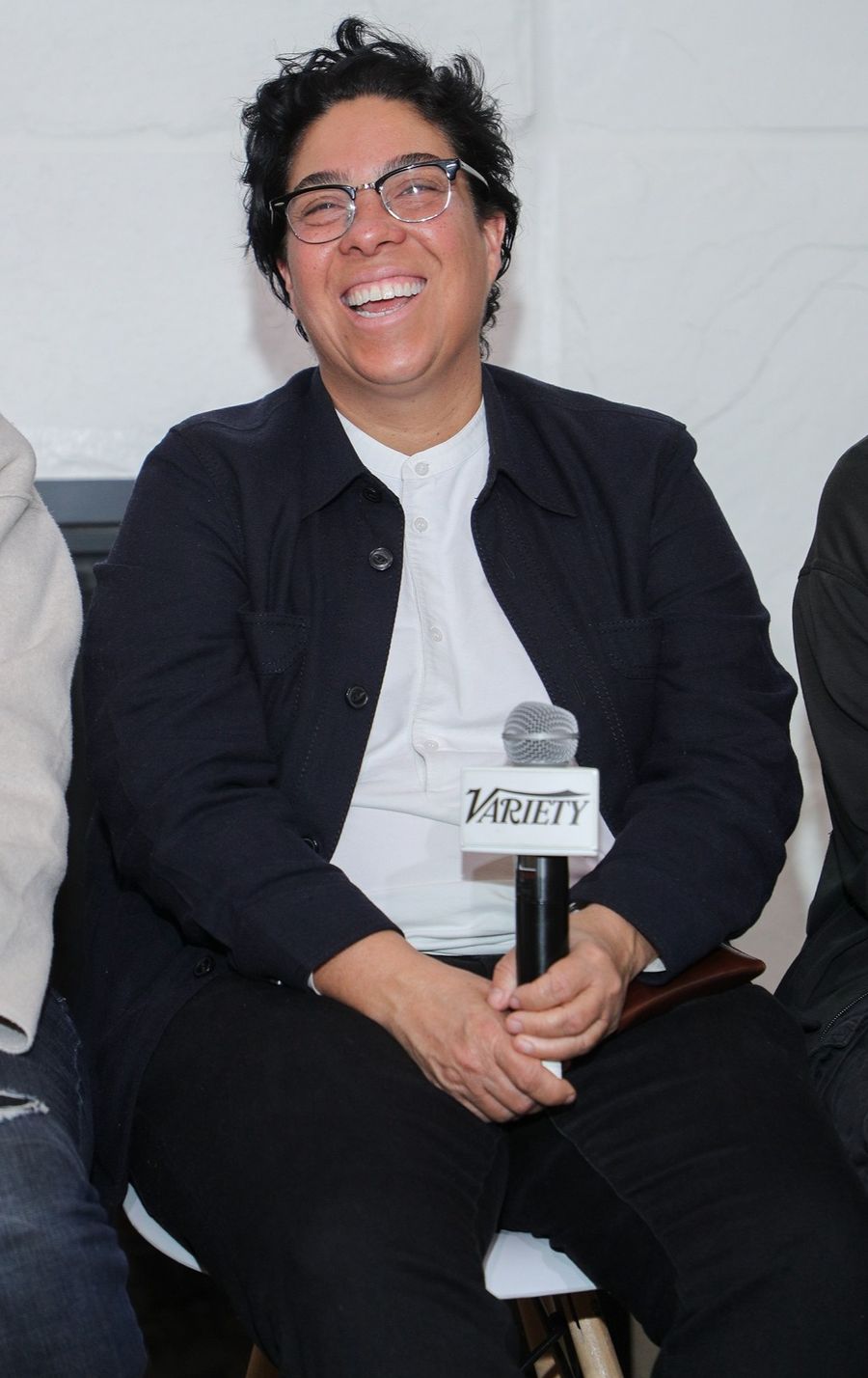
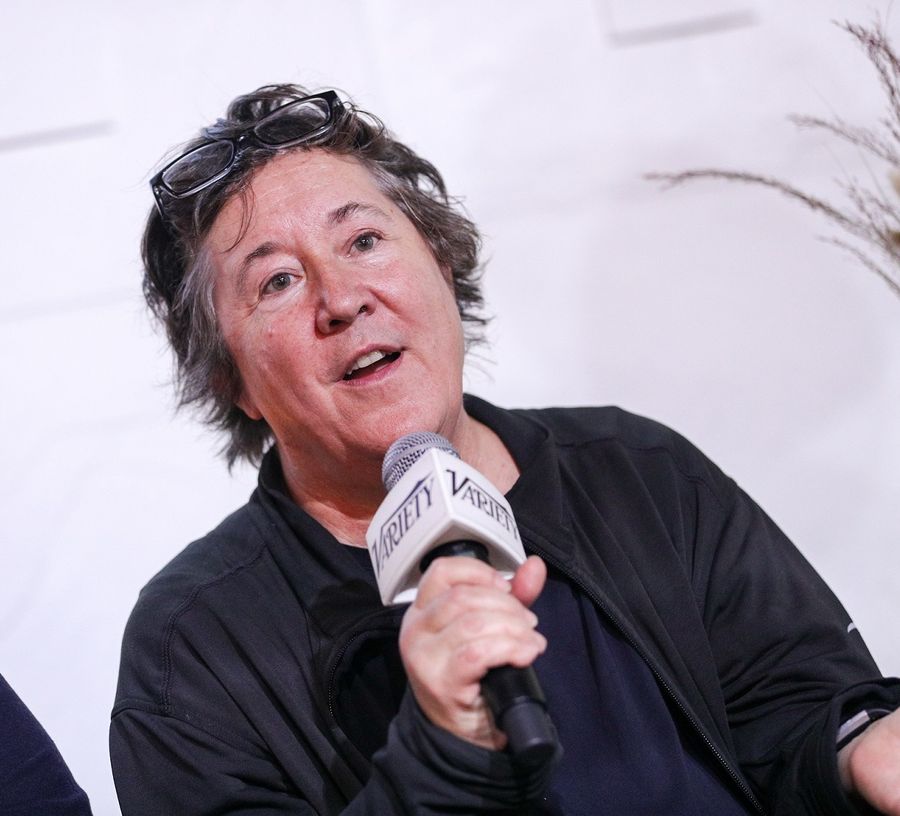
Christine Vachon
Christine Vachon is an Independent Spirit Award-winning producer. She has been lauded for her career filmmaking with the Producer Award from the Gotham Independent Film Awards.
She co-founded, with Pamela Koffler, the impactful independent film and television production company Killer Films in 1995. Killer's Oscar-winning films have included Kimberly Peirrce's Boys Don't Cry and Richard Glatzer and Wash Westmoreland's Still Alice. Its Oscar-nominated films have included Todd Haynes' Carol, I'm Not There, and Far From Heaven. The latter swept the Independent Spirit Awards, winning five including Best Actress (Julianne Moore), Best Director, and Best Feature. In her capacity as director, Ms. Vachon has again been nominated in the Spirits' Best Feature category, most recently for Carol; the film also brought her a BAFTA Award nomination, among other honors.
Ms. Vachon's dozens of other Killer movies have included Mr. Haynes' Safe, Velvet Goldmine, and Wonderstruck; Todd Solondz's Wiener-Dog, Storytelling, and Happiness; Miguel Arteta's Beatriz and Dinner, starring Salma Hayek and John Lithgow; Nigel Finch's Stonewall; Rose Troche's The Safety of Objects, which marked the breakout role for Kristen Stewart; Todd Graff's Camp, which marked the breakthrough role for Anna Kendrick; Mary Harron's The Notorious Bettie Page, starring Gretchen Mol; Tommy O'Haver's An American Crime, starring Catherine Keener and Ellen Page; Jordan Scott's Cracks, with Juno Temple and Maria Valverde; Andrew Neel's Goat; Elizabeth Wood's White Girl, starring Morgan Saylor; Andrew Dosunmu's Where Is Kyra?, starring Michelle Pfeiffer; Paul Schrader's First Reformed; and upcoming, Brady Corbet's Vox Lux, starring Natalie Portman, Raffey Cassidy, and Jennifer Jason Leigh.
Ms. Vachon is also the director of the MFA program at Stony Brook University.
Effie Brown
Effie T. Brown is an award winning film, television, and digital Producer. Brown's long and illustrious career began as a Film Independent fellow in the prestigious “Project Involve” program. During her fellowship, she gained invaluable insight into the film industry. Her incredible work ethic and creative freedom allowed her to advance quickly through ranks becoming Director of Development for Tim Burton Productions in 1995. Decades later, Brown now serves as a Film Independent Board member and mentors the new generation of fellows.Throughout her career, Brown has produced several critically acclaimed HBO Films and award-winning projects including, Stranger Inside (directed by Cheryl Dunne, 2001, World Premiere at Sundance Film Festival), Real Women Have Curves (directed by Patricia Cardosa, 2002, winner of Sundance Film Festival’s Audience Award and Special Jury Prize for Ensemble Performance), Everyday People (2004, directed by Jim McKay), In The Cut (directed by Jane Campion, 2003) and Rocket Science (directed by Jeffrey Blitz, 2007, winner of the Grand Jury Prize for Directing at Sundance and recipient of three Independent Spirit Awards nominations, including Best First Feature, Best Screenplay and Best Actress). In 2010, her film The Inheritance, starring Golden Brooks, won the Best Actress award at the American Black Film Festival. In 2011, Brown re-teamed with the award winning producing/directing duo Jon Avnet and Rodrigo Garcia to produce over 130 episodes of WIGS, an award winning, original content channel funded by Google/YouTube and FOX Broadcasting.
Brown then went on to produce the highly acclaimed independent feature, Dear White People. The film won multiple awards, including the Special Jury Prize for Breakthrough Talent at the 2014 Sundance Film Festival. In 2015, she served as producer and mentor on Project Greenlight to the show’s fresh new director. Brown joined Lee Daniels Entertainment in 2016 to Executive Produce Season 1 of the hit series Star on FOX. In keeping with her commitment to inclusive and diverse content Effie Executive Produced Disney Channel’s Zombies which premiered in 2018. The high school musical delivers an inspirational story about tolerance, inclusion, individuality and conviction…but with zombies. Currently, Brown returns to her love of inclusive genre film & television (Thriller, Action, Sci-fi, Horror) by securing several “big concept” IP told through an inclusive storytelling lens. Her company, Duly Noted Inc. continues to be dedicated to groundbreaking narratives that use genre to challenge and advance our culture in a disruptive way. Her dream is to change the world through film and TV –celebrating our differences while bringing us all closer together.
